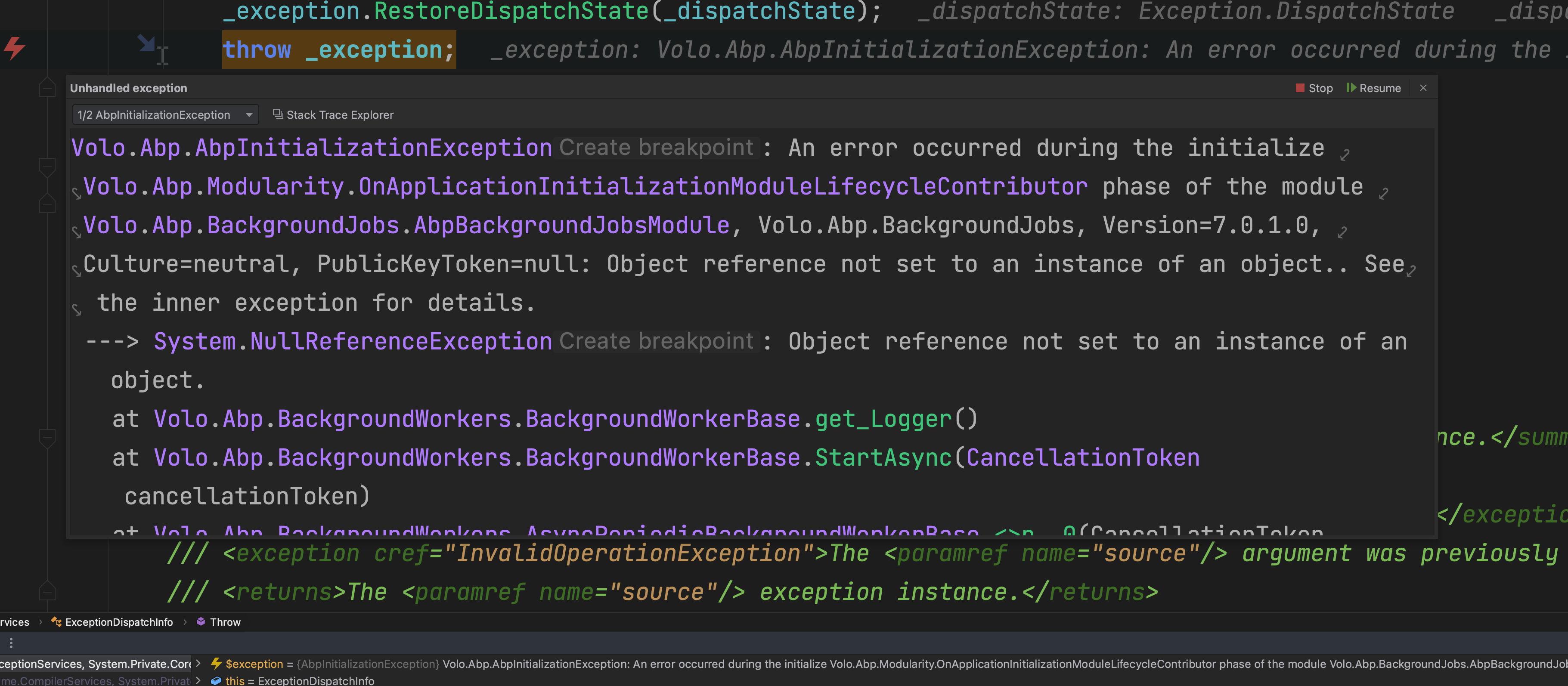Are there any guidelines for integrating ABP with an Azure Durable Function? I am trying to call my Application Services and Repositories.
This is my Program.cs
var host = new HostBuilder()
.ConfigureFunctionsWorkerDefaults(x => x.UseMiddleware(), options => {})
.ConfigureAppConfiguration((hostContext, config) =>
{
config.AddJsonFile("appsettings.json", optional: false);
})
.ConfigureServices((hostBuilderContext, services) =>
{
services.AddOptions();
services.AddApplicationAsync(x =>
{
x.Services.ReplaceConfiguration(hostBuilderContext.Configuration);
});
services.Configure<ProcessorOptions>(hostBuilderContext.Configuration.GetSection(nameof(ProcessorOptions)));
var processorOptions = hostBuilderContext.Configuration.Get<ProcessorOptions>();
services.AddLogging();
})
.Build();
host.Run();
I am getting a lot of exceptions with trying to access any of my Repositories.
9 Answer(s)
-
0
Hi,
Can you share the error logs?
And you can check this:
- https://support.abp.io/QA/Questions/4741/Client-Proxy-from-Azure-Function
- https://support.abp.io/QA/Questions/4821/Abp-Framework
-
0
I updated the code based upon the links that you've send. I am getting the error as below. I am trying to lookup a user, in the Azure Activity Function I have the following:
public CreateTestFunction(IIdentityUserRepository identityUserRepository, IProductRepository productRepository) { _identityUserRepository = identityUserRepository; _productRepository = productRepository; }Exception:
Volo.Abp. AbpInitializationException Create breakpoint: An error occurred during the initialize Volo. Abp. Modularity. OnApplicationInitializationModuleLifecycleContributor phase of the module sVolo.Abp. BackgroundJobs. AbpBackgroundJobsModule, Volo. Abp.BackgroundJobs, Version=7.0.1.0, 2 Culture=neutral, PublicKeyToken=null: Object reference not set to an instance of an object.. See, § the inner exception for details. ---> System. NullReferenceException Create breakpoint : Object reference not set to an instance of an object. at Volo. Abp. BackgroundWorkers. BackgroundWorkerBase. get_Logger at Volo.Abp. BackgroundWorkers. BackgroundWorkerBase. StartAsync(CancellationToken cancellationToken)
using Microsoft.Extensions.Configuration; using Microsoft.Extensions.DependencyInjection; using Microsoft.Extensions.Hosting; using Volo.Abp; using Volo.Abp.Threading; using Sample.Processor; using Sample.Processor.Options; var hostBuilder = new HostBuilder() .ConfigureFunctionsWorkerDefaults() .ConfigureAppConfiguration((hostContext, config) => { config.AddJsonFile("appsettings.json", optional: false); }) .ConfigureServices(async (hostBuilderContext, services) => { services.AddOptions(); await services.AddApplicationAsync<AzureFunctionProcessorModule>(x => { x.Services.ReplaceConfiguration(hostBuilderContext.Configuration); }); services.Configure<ProcessorOptions>(hostBuilderContext.Configuration.GetSection(nameof(ProcessorOptions))); services.AddLogging(); }); var host = hostBuilder.Build(); var application = host.Services.GetRequiredService<IAbpApplicationWithExternalServiceProvider>(); var applicationLifetime = host.Services.GetRequiredService<IHostApplicationLifetime>(); applicationLifetime.ApplicationStopping.Register(() => { AsyncHelper.RunSync(() => application.ShutdownAsync()); }); applicationLifetime.ApplicationStopped.Register(() => { application.Dispose(); }); await application.InitializeAsync(host.Services); host.Run();using Microsoft.Extensions.DependencyInjection; using Volo.Abp; using Volo.Abp.Autofac; using Volo.Abp.Identity; using Volo.Abp.Identity.MongoDB; using Volo.Abp.Modularity; using Sample.MongoDB; namespace Sample.Processor; [DependsOn(typeof(WholesaleFriendlyMongoDbModule))] [DependsOn(typeof(AbpIdentityApplicationModule))] [DependsOn(typeof(AbpAutofacModule))] public class AzureFunctionProcessorModule : AbpModule { public override void PreConfigureServices(ServiceConfigurationContext context) { } public override void ConfigureServices(ServiceConfigurationContext context) { context.Services.AddTransient<IIdentityUserRepository, MongoIdentityUserRepository>(); } public override void OnApplicationInitialization(ApplicationInitializationContext context) { } }Also, which nugets should I include in this project?
-
0
Hi,
You need to replace dependency injection with autofac
-
0
Do you mind being a bit more specific? Where exactly are you referring to?
For example, the below produces the same error.
using Volo.Abp; using Volo.Abp.Autofac; using Volo.Abp.Identity; using Volo.Abp.Modularity; using WholesaleFriendly.MongoDB; namespace WholesaleFriendly.Processor; [DependsOn(typeof(WholesaleFriendlyMongoDbModule))] [DependsOn(typeof(AbpIdentityApplicationModule))] [DependsOn(typeof(AbpAutofacModule))] public class AzureFunctionProcessorModule : AbpModule { public override void PreConfigureServices(ServiceConfigurationContext context) { } public override void ConfigureServices(ServiceConfigurationContext context) { } public override void OnApplicationInitialization(ApplicationInitializationContext context) { } } -
0
I explain how to use Autofac in this answer
https://support.abp.io/QA/Questions/4821/Abp-Framework#answer-3a0a5c6a-4610-4c66-69ce-549a079f48c8
-
0
The example you gave is for in-process worker functions. But I did update the code as follows, I am still getting an error on some modules, but the below works and I am able to inject IIdentityUserRepository and query it.
[Program.cs] using Autofac; using Autofac.Extensions.DependencyInjection; using Microsoft.Extensions.Configuration; using Microsoft.Extensions.DependencyInjection; using Microsoft.Extensions.Hosting; using Volo.Abp; using Volo.Abp.DependencyInjection; using Volo.Abp.Identity; using Volo.Abp.Threading; using Sample.SecondProcessor; var host = new HostBuilder() .UseServiceProviderFactory(new AutofacServiceProviderFactory()) .AddAppSettingsSecretsJson() .UseAutofac() .ConfigureContainer<ContainerBuilder>(builder => { }) .ConfigureAppConfiguration((hostContext, config) => { config.AddJsonFile("appsettings.json", optional: false); }) .ConfigureServices(services => { services.AddSingleton<ICancellationTokenProvider>(NullCancellationTokenProvider.Instance); services.AddSingleton<IAbpLazyServiceProvider,AbpLazyServiceProvider>(); services.AddApplication<AzureFunctionProcessorModule>(x => { x.UseAutofac(); }); var serviceProvider = services.BuildServiceProvider(); serviceProvider.GetRequiredService<IAbpApplicationWithExternalServiceProvider>().Initialize(serviceProvider); }) .ConfigureFunctionsWorkerDefaults() .Build(); host.Run(); [SampleModule.cs] using Microsoft.Extensions.DependencyInjection; using Volo.Abp; using Volo.Abp.Autofac; using Volo.Abp.BackgroundJobs; using Volo.Abp.DependencyInjection; using Volo.Abp.Domain; using Volo.Abp.Identity; using Volo.Abp.Identity.MongoDB; using Volo.Abp.Modularity; using Volo.Abp.OpenIddict.Tokens; using Volo.Abp.Threading; using Volo.Abp.Uow; using Sample.MongoDB; namespace Sample.SecondProcessor; [DependsOn( typeof(AbpIdentityDomainModule), typeof(AbpAutofacModule), typeof(AbpIdentityMongoDbModule), typeof(SampleApplicationContractsModule), //typeof(SampleMongoDbModule) )] public class AzureFunctionProcessorModule : AbpModule { public override void PreConfigureServices(ServiceConfigurationContext context) { } public override void ConfigureServices(ServiceConfigurationContext context) { context.Services.AddTransient<IIdentityUserRepository, MongoIdentityUserRepository>(); Configure<AbpUnitOfWorkDefaultOptions>(options => { options.TransactionBehavior = UnitOfWorkTransactionBehavior.Disabled; }); Configure<AbpBackgroundJobOptions>(options => { options.IsJobExecutionEnabled = false; }); Configure<TokenCleanupOptions>(options => { options.IsCleanupEnabled = false; }); } public override void OnApplicationInitialization(ApplicationInitializationContext context) { } }If I uncomment SampleMongoDbModule, it fails and I get the generic :
[2023-05-02T17:58:14.180Z] Language Worker Process exited. Pid=30853. [2023-05-02T17:58:14.180Z] dotnet exited with code 214 (0xD6). . [2023-05-02T17:58:14.277Z] Failed to start a new language worker for runtime: dotnet-isolated. [2023-05-02T17:58:14.277Z] System.Private.CoreLib: A task was canceled.
Otherwise it works. Also, most of the Pro modules fail with the same error. I thought it might be a license key issue? So I added .AddAppSettingsSecretsJson() and copied my key over. However, it still fails. Also note, that I had to set both IsJobExecutionEnabled and IsCleanupEnabled to false or else it would throw an exception as in the screenshot in my previous comment.
I believe this will work in In-process mode, but I don't want to have to downgrade my projects to NET 6.0.
-
0
Hi,
I didn't see the error message about the license, but you should make sure the license code exists in the
appsettings.jsonorappsettings.secret.jsonfile.You can check if it is configured correctly this way:
public override void ConfigureServices(ServiceConfigurationContext context) { var configuration = context.Services.GetConfiguration(); var licenseCode = configuration["AbpLicenseCode"]; } -
0
That seemed to be the issue. Even though the appsettings.secret.json file was loaded, which I confirmed, the key was not being loaded. Copying the license key to appsettings.json works. The issue with isolated function apps is that many errors that are not in-code, are swallowed, and the above generic message is displayed. It's an issue that's been reported many times already. https://github.com/Azure/azure-functions-dotnet-worker/issues/532#issuecomment-1384065083
I might either create a gist or simple guide for this. I lost almost a week trying to get this to work :)
-
0
ok


























































